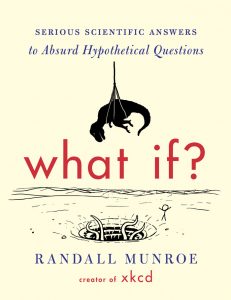
It’s been a while since I read a physical book. Most of my reading these days is done on the kindle and, while I still have physical text books for my maths degree, I have a lot of books just waiting to be read. What If? by xkcd creator Randall Munroe is one of these. I was given this as a present a few years ago and, despite my initial excitement (having been a reader of xkcd since about comic 17212) the book had sat on my bedside table under the kindle but just above the half-read “Sagas of the Icelanders” that I’d bought on my honeymoon. Last week I picked it up and started reading. I read just under half in that first sitting and then two days later finished it. I wish I’d read it the day it was given to me.
The book is an attempt to answer absurd hypothetical questions with solid science and is based on a subsection of the xkcd website of the same name. From “how long would it take the oceans to drain?” to “what would happen if you put a hairdryer in a sealed box and turned it on?”. Each of the answers Randall gives has been researched to give as complete an answer as possible, with citations. There are even some whimsical Wikipedia style [citation needed] references against the bleeding obvious. Every time I came across one of these my brain read instead as ‘Me nem nesa’3.
In the style familiar to anyone who regularly reads the xkcd comic, Randall doesn’t stop there. He also explores some of the assumptions of the question or answer and the effect that changes would have, which is good scientific practise anyway :), even if the majority of these changes are black hat suggesting more power is applied.

While some of the questions were already published on the website, over half were new when the book was written, along with questions that Randall didn’t answer (which he labels as “weird and worrying”). My favourite has to be the “Periodic wall of Elements” which I will pose to my chemist father next time I’m over for dinner45. That question comes with the extra “don’t try this at home” disclaimer6 on top of the general warning at he start of the book: “The author of this book is an Internet cartoonist, not a health and safety expert. He likes it when things catch fire or explode, which means he does not have your best interests in mind”.
The edition I have has a special UK preface on units and how both the UK and US hang on to non SI measures, along with suggestions for more. I even discovered a new unit of measure I’d never encountered before and from now on the baking instructions for all my recipes will be in degrees Rankine7.
The whole thing is a delight. Randall’s easy humour, simple drawings and detailed understanding of physics make this book entertaining on many levels. Far from ending absurd hypothetical debate, I hope people who read it will be inspired to come up with even more absurd questions and try to solve them themselves8. If you don’t have a copy already, you should get one.
- I had a daily ritual back then of reading webcomics with my morning tea that included xkcd, LFG, PHD, some long since defunct Warcraft comics and a few others. Now I find I tend to catch up with months worth at a time when I have an hour or so to spare. ↩
- Back before I discovered a taste for good coffee. ↩
- It is known ↩
- The rhymes he gave me to memorise the order of the elements didn’t include their interactive properties. He’d argue that if I’d learned anything at all about their chemistry then it’s obvious 🙂 ↩
- He’s right about this. ↩
- I’d also like to reinforce that you shouldn’t wear Technerium as a hat. ↩
- You can look this up yourself 🙂 ↩
- I have a hope that one day all internet trolling will be solely nuanced discussion on scientific theory. ↩